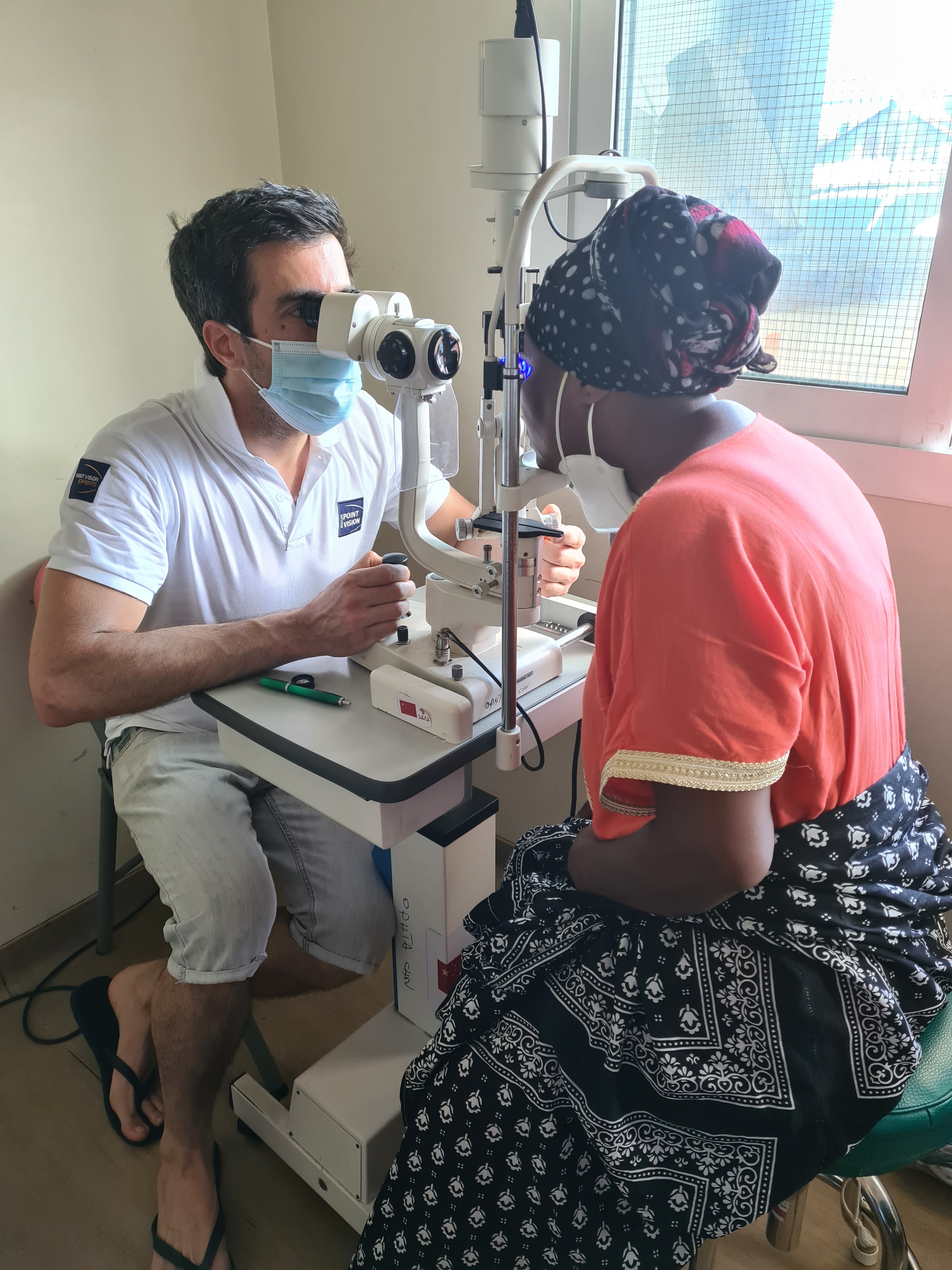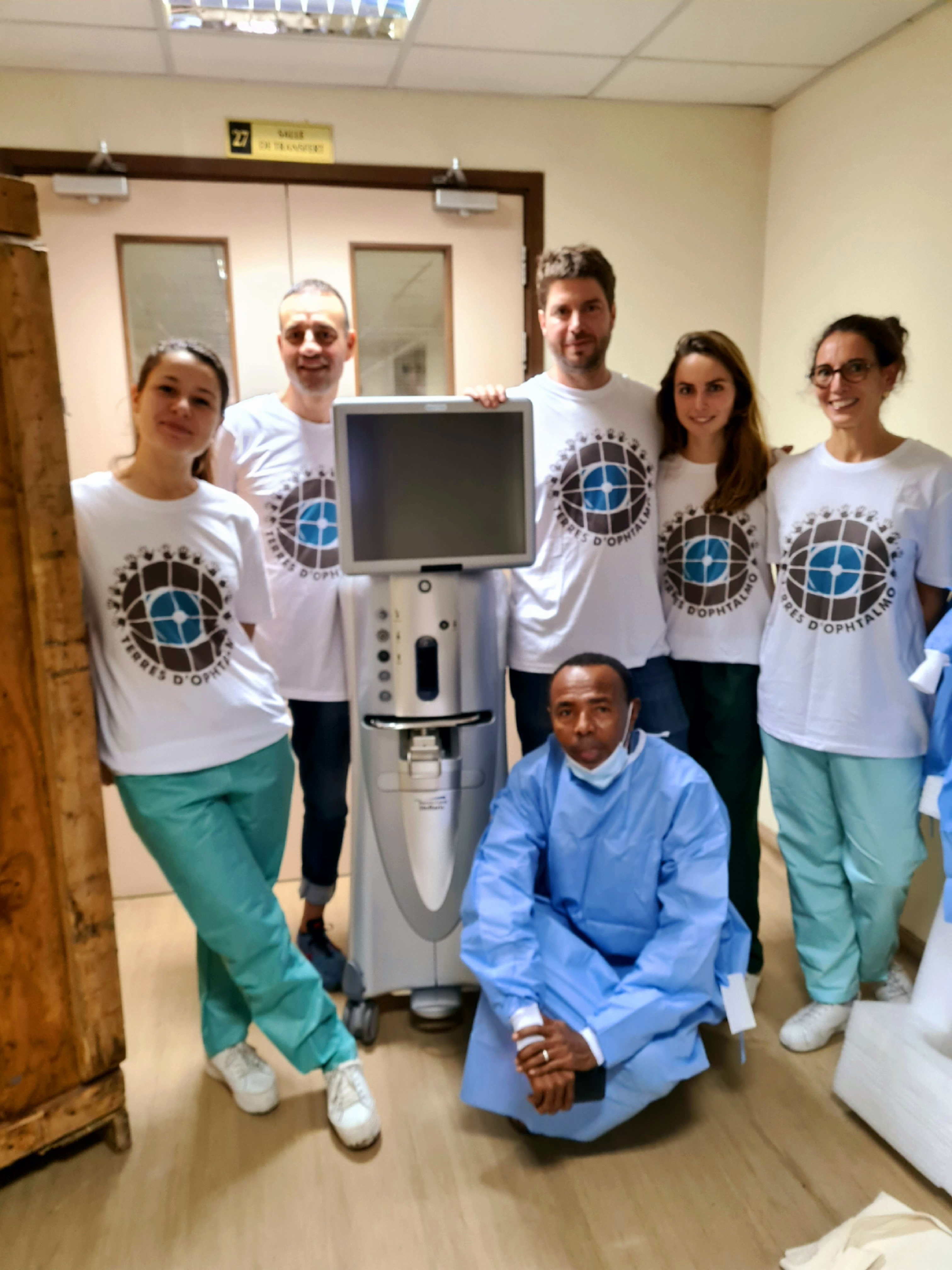For the eyes only! Interview with Thibaut Leroy, ophthalmologist, and co-founder of Terres d’Ophtalmo
 He is one of those people you like immediately when you meet them. Friendly, competent and generous, he knows how to put his patients at ease. Since 2015, Dr. Leroy has been participating in humanitarian ophthalmological surgery missions. He first joined the association Pour les Yeux du Monde with which he left for Cambodia to operate on the block boat sailing on the Mekong River, then in 2016 and 2017 to Madagascar, in the St Damien clinic in the Ambanja district.
He is one of those people you like immediately when you meet them. Friendly, competent and generous, he knows how to put his patients at ease. Since 2015, Dr. Leroy has been participating in humanitarian ophthalmological surgery missions. He first joined the association Pour les Yeux du Monde with which he left for Cambodia to operate on the block boat sailing on the Mekong River, then in 2016 and 2017 to Madagascar, in the St Damien clinic in the Ambanja district.
In 2018, he and his friend Dr. Camille Rambaud set up the association Terres d’Ophtalmo. This association aims to perpetuate the ophthalmological care of patients by training practitioners on site. One of the particularities of such humanitarian surgery is the complexity of the interventions when cataracts are in an advanced state. These are indeed much "harder" to deal with. On the other hand, the surgical material available in poor countries is reduced to a minimum and is often in poor condition. So, all these facts together made Dr Leroy and his friends decide to set up their own association where quality and sustainability are key.
After all, the eyes are important parts of our body, and becoming blind is one of the worst things that can happen to a person who used to have a full-fledged vision. The blind are often excluded from society, so, the more people who can benefit from Dr Leroy and his friends, the better.
His last mission took place in Comoros in the Indian Ocean in November 2020, and in a couple of months he will go on another mission, to Madagascar, to set up another project. So let us leave the floor to Dr Leroy.
Q: Could you tell us a little about yourself?
I’m in my early forties. I studied medicine in Paris, and I did my ophthalmology specialization at Lille, where I made some really good friends, and together we have developed our specialty skills and our association. It has always been very important for me to give and giving my free time has always been something I have done. During my studies, I went to Burkina Faso. One of the advantages of being an ophthalmologist is that you have a comfortable income, and that allows you to give to others. So, we started to do humanitarian missions with different existing associations. With them I went on missions to Madagascar and Cambodia. One of the problems with this association was that there was lots of goodwill and good deeds but no continuity of the humanitarian surgical action. So, when we were no longer present, nothing happened.
With the President of Terres d’Ophtalmo, Camille R, we started to reflect upon how we could remedy this situation: we go on a mission for 10 days, and then the remaining 355 days nothing happens. Then we came up with this solution, we go on a field mission, do ophthalmology and train the local medical doctor to do ophthalmology so that when we are not around, she/he will continue.
We come with quality equipment so that people can get surgery and so that the ophthalmology care continues when we are not present.
There are huge gaps in the levels of ophthalmology care from one place to another. For instance, in the Comoros, there are three islands, and there is one ophthalmologist per 1 million inhabitants. This translates into a huge discrepancy between offer and demand.
Q: We do not think much about it and take it for granted, but having good eyes is important.
Well, it has a huge impact. For instance, let us take people who cannot see anything because they have curable diseases. Such people are often useless in society, even a burden for their family when they cannot work in the fields, or even take care of the grandchildren.
Q; Do we really understand how important cataracts and other eye ailments can be?
Cataracts are the first cause of blindness and represent 60 percent of all the cases in developing countries. In France, this ailment represents only 3 to 4 percent, because it is diagnosed much earlier, when it can be easily treated. In France there are other pathologies, more serious ones, such as glaucoma, which represent a lower percentage in the field, as people afflicted with them have shorter life expectancy.

Q: Going back to your association, how do you finance your activities?
Basically, the association functions with donations. It was set up in 2017, and now we are about twenty ophthalmologists and surgeons and a “grand-mother” working in the Red Cross. He is helping us with administrative issues. We are all volunteers; nobody receives any kind of remuneration. From time to time, ophthalmologists going into retirement donate their equipment, and we pass it on. We are always interested in getting in touch with ophthalmologists who are planning to give up using their equipment. We are trying to set up a kind of sub-group to deal with this. We are renting a small box where we keep this second-hand equipment, and then we put everything into a container for shipping. We always make sure, before sending off this equipment, that the receiver will use it well, that it’s a serious undertaking. There is always a risk of corruption, and we do not want this thing to happen.
For instance, we always go to a place on an investigative mission to see if it is reliable and if the “funds” we are going to “invest” are going to make a difference. Usually, we go two or three at the same time to study the conditions on the ground. We look into all imaginable details. Each time, we do the ground work thoroughly because the foundations have to be solid.
We have worked quite a lot in Morocco where we have brought with us our expertise and taught technical subjects. We go to the Comoros, where there are several islands. We try to have somebody on each of the three islands, and we try to go there on a regular basis to do the follow-up. We are now preparing for a mission to Madagascar to work with another association which is already based there and receiving patients. They need more people and do not have the appropriate technical skills. So, we will go there to share our knowledge and teach the local medical doctors and will bring them medical equipment.
We have also set up partnerships with companies selling ophthalmology medical equipment, medicines, and intraocular lens implants. We also organize charity events, and then we do crowd-funding campaigns. Right now, we have one ongoing so that we can buy a sophisticated small machine that is the size of a suitcase.
We are also considering creating a kind of clearing house for buying medical equipment from China and India. They have very reasonable prices for ophthalmology medical equipment, and the quality is very good. So we are looking for some serious partners.
In general, we follow our “clients” over several years, three to four years, making sure that everything is going well, that it is self-financing, and they do not need any further assistance. When we are satisfied with the long-term outcome, we will go to another country. We are currently exploring possibilities in Senegal that might become our next partner.
One of the biggest challenges we have had was that the Covid pandemic made it impossible to travel. The Comoros and Madagascar did not accept visitors, so, we have unfortunately lost almost two years of work.
Q: Going back to the Comoros activities. How is the situation today?
Today we have a local partner, a Comorian ophthalmologist who receives us when we come. He recruits the staff, and we have two to three interns in ophthalmology, who also benefit from our venue to learn surgery, and develop their scientific knowledge in the field. So, each time we come, we also organize a Comorian ophthalmology gathering with several medical experts because the eyes are an organ that can have other pathologies – diabetes, stroke, cardiovascular diseases etc. For instance, patients with diabetes have to have a regular follow-up because they might have problems with the eyes. So, the interns learn about different pathologies, and once the Conference is over, we go to the different islands and there we train the interns in surgery for approximately two weeks. We have a mission leaving for the Comoros in October/November, and I will go with two other colleagues to Madagascar for a two-week mission to evaluate the need and put in place the team to be in the field. The clinic is already there, and there were surgeons working there earlier but for many years the clinic has been abandoned. So, we must put it back in shape, and we have started crowdfunding for a machine giving us a chance to do cataract surgery. The machine is not bigger than a suitcase. With this machine we can offer the same cataract operation to the patients as they get in Europe. It costs about 30,000 euros and will make a huge difference for the patients.
Q: Are you open for new members?
Of course, we welcome new members, those who can contribute something to the association. We have a graphic designer who made our logo, we have somebody who made the video, some are handling the financial management and the administration. We are open to everybody, whether they are experts in logistics or have other skills.
We normally have one big meeting once a year, during the big annual gathering of ophthalmologists in Paris in May . Then we have smaller meetings three or four times a year to share information. We are transparent, so, all the information is to be found on our website. https://www.terresdophtalmo.org/
While walking out of Dr Leroy’s office, after having learned about all the good work he and his friends are doing, I can only wish that there are others who can be inspired by their work.
https://www.helloasso.com/associations/terres-d-ophtalmo
credit photo : Dr CHARPENTIER Stacy and Dr DAVID Clémentine


